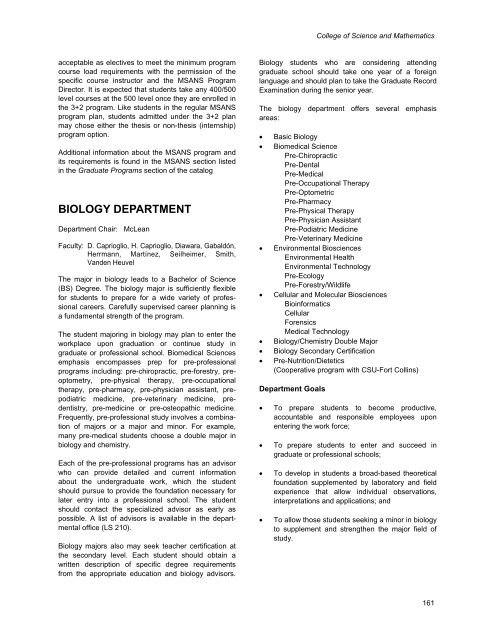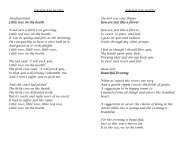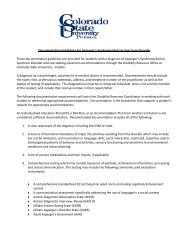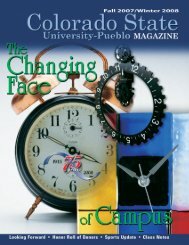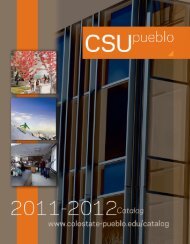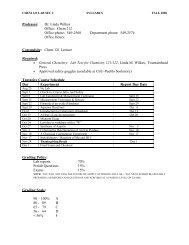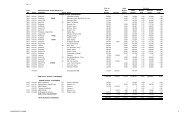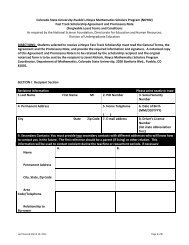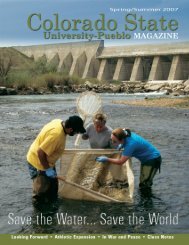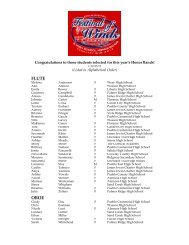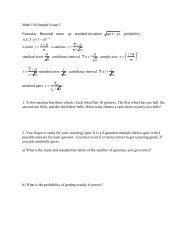2007-2008 Catalog (PDF) - Colorado State University-Pueblo
2007-2008 Catalog (PDF) - Colorado State University-Pueblo
2007-2008 Catalog (PDF) - Colorado State University-Pueblo
Create successful ePaper yourself
Turn your PDF publications into a flip-book with our unique Google optimized e-Paper software.
College of Science and Mathematics<br />
acceptable as electives to meet the minimum program<br />
course load requirements with the permission of the<br />
specific course instructor and the MSANS Program<br />
Director. It is expected that students take any 400/500<br />
level courses at the 500 level once they are enrolled in<br />
the 3+2 program. Like students in the regular MSANS<br />
program plan, students admitted under the 3+2 plan<br />
may chose either the thesis or non-thesis (internship)<br />
program option.<br />
Additional information about the MSANS program and<br />
its requirements is found in the MSANS section listed<br />
in the Graduate Programs section of the catalog<br />
BIOLOGY DEPARTMENT<br />
Department Chair: McLean<br />
Faculty: D. Caprioglio, H. Caprioglio, Diawara, Gabaldón,<br />
Herrmann, Martínez, Seilheimer, Smith,<br />
Vanden Heuvel<br />
The major in biology leads to a Bachelor of Science<br />
(BS) Degree. The biology major is sufficiently flexible<br />
for students to prepare for a wide variety of professional<br />
careers. Carefully supervised career planning is<br />
a fundamental strength of the program.<br />
The student majoring in biology may plan to enter the<br />
workplace upon graduation or continue study in<br />
graduate or professional school. Biomedical Sciences<br />
emphasis encompasses prep for pre-professional<br />
programs including: pre-chiropractic, pre-forestry, preoptometry,<br />
pre-physical therapy, pre-occupational<br />
therapy, pre-pharmacy, pre-physician assistant, prepodiatric<br />
medicine, pre-veterinary medicine, predentistry,<br />
pre-medicine or pre-osteopathic medicine.<br />
Frequently, pre-professional study involves a combination<br />
of majors or a major and minor. For example,<br />
many pre-medical students choose a double major in<br />
biology and chemistry.<br />
Each of the pre-professional programs has an advisor<br />
who can provide detailed and current information<br />
about the undergraduate work, which the student<br />
should pursue to provide the foundation necessary for<br />
later entry into a professional school. The student<br />
should contact the specialized advisor as early as<br />
possible. A list of advisors is available in the departmental<br />
office (LS 210).<br />
Biology majors also may seek teacher certification at<br />
the secondary level. Each student should obtain a<br />
written description of specific degree requirements<br />
from the appropriate education and biology advisors.<br />
Biology students who are considering attending<br />
graduate school should take one year of a foreign<br />
language and should plan to take the Graduate Record<br />
Examination during the senior year.<br />
The biology department offers several emphasis<br />
areas:<br />
• Basic Biology<br />
• Biomedical Science<br />
Pre-Chiropractic<br />
Pre-Dental<br />
Pre-Medical<br />
Pre-Occupational Therapy<br />
Pre-Optometric<br />
Pre-Pharmacy<br />
Pre-Physical Therapy<br />
Pre-Physician Assistant<br />
Pre-Podiatric Medicine<br />
Pre-Veterinary Medicine<br />
• Environmental Biosciences<br />
Environmental Health<br />
Environmental Technology<br />
Pre-Ecology<br />
Pre-Forestry/Wildlife<br />
• Cellular and Molecular Biosciences<br />
Bioinformatics<br />
Cellular<br />
Forensics<br />
Medical Technology<br />
• Biology/Chemistry Double Major<br />
• Biology Secondary Certification<br />
• Pre-Nutrition/Dietetics<br />
(Cooperative program with CSU-Fort Collins)<br />
Department Goals<br />
• To prepare students to become productive,<br />
accountable and responsible employees upon<br />
entering the work force;<br />
• To prepare students to enter and succeed in<br />
graduate or professional schools;<br />
• To develop in students a broad-based theoretical<br />
foundation supplemented by laboratory and field<br />
experience that allow individual observations,<br />
interpretations and applications; and<br />
• To allow those students seeking a minor in biology<br />
to supplement and strengthen the major field of<br />
study.<br />
161


